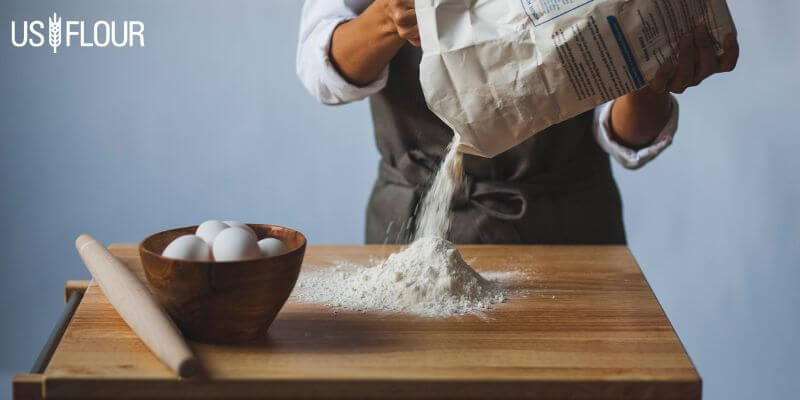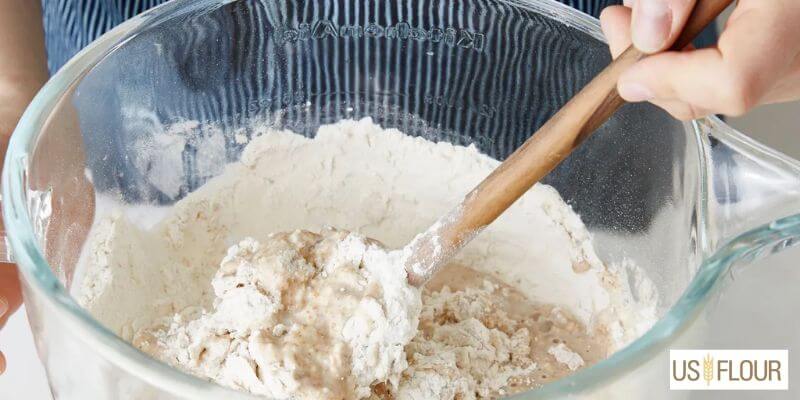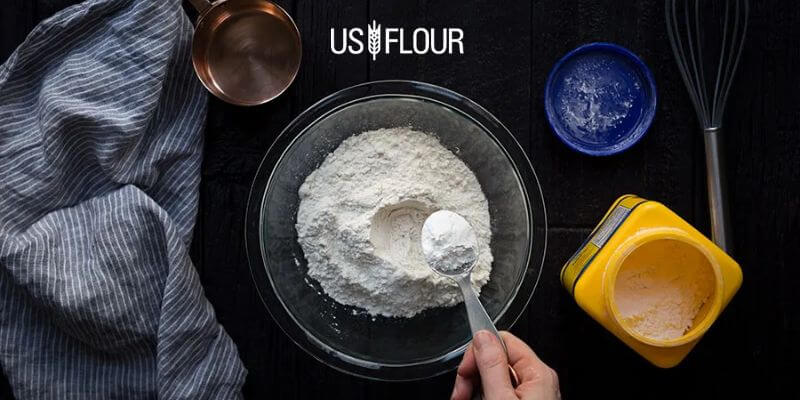Delicious Baking with the Wonder of Pastry Flour

Pastry flour is a common recipe known worldwide for its ease to use and versatility. It is a soft, low-gluten flour with a gluten content of about 8 to 10%. This content makes it suitable for making pastry dough, pies, cookies, muffins, and biscuits.
What Is Pastry Flour?

Soft flour, pastry flour is made from soft red winter wheat or soft white wheat. It has a fine texture and a low protein content, which is the gluten that gives baked products a finer, softer crumb. In other words, flour with more protein has longer gluten strands, increasing its elasticity.
Also, combining high protein flours with yeast, a strong leavener produces a chewier texture, more open crumb, and large air bubbles. On the other hand, mixing less protein flour with a weaker leavening agent, such as baking soda and baking powder, produces less elasticity and smaller bubbles. The result of this is often a more tender and softer product.
Common examples of items that pastry flour is used to make include pie doughs, Danish and puff pastries, croissants, doughnuts, biscuits, pancakes, pastries, muffins, and cookies.
Is Pastry Flour Good for Your Health?

Pastry flour is healthy. It goes through fine milling, but unlike cake flour which is bleached and finely milled, it is not bleached. As a result, some of its bran and germs, essential to many bodily functions, are retained. Pastry flour also consists of other essential nutrients and minerals.
It also contains fiber, which helps regulate your body’s sugar utilization. It is also good for controlling blood sugar and hunger. It can also help maintain bowel health, especially if you have loose stool. By absorbing water, your stool will solidify due to the fiber present in this flour.
Additionally, whole wheat pastry flour is made from milled wheat berries and whole grains; it is healthier than pastry flour. There is less protein in whole wheat pastry, but it has more minerals, vitamins, and fiber. It is not recommended for those with gluten sensitivity or celiac disease due to the high amount of gluten in it.
Despite being unhealthy when overconsumed, goodies made with pastry flour and whole wheat pastry flour are unavoidable because they make the ideal breakfast. As a result, consume them moderately to avoid health problems.
Additionally, ensure your diet is well-balanced and includes plenty of vegetables and fruits. Make the necessary lifestyle changes, such as increasing your exercise to burn extra calories.
Pastry Flour Does Not Contain Addictive
Soft red or white wheat is used to make whole wheat pastry flour. Due to being unbleached and organic, it is free of additives and GMOs. Pastry flour is characterized by its fresh flavor and aroma, delicate texture, and natural off-white color. You may find bleached pastry flour containing chlorine gas residues in some cases.
Pastry flour should be refrigerated because it does not contain preservatives. Doing this will help retain its freshness. Although there are no additives, ascorbic acid, also known as vitamin C, is present in most baking flour.
You can occasionally find alpha-amylase, an enzyme that naturally occurs in wheat. It is safe and aids in standardizing your flour, making it possible to bake consistently.
Pastry Flour Does Not Help with Weight Loss
You must avoid consuming pastry flour snacks if you want to lose weight. The reason for this is that many pastries contain artificial fats, refined flour, and sugars, which are harmful to your body and can lead to various diseases.
Additionally, pastries can’t satiate your appetite, so you’ll start to feel hungry again right away after eating that muffin or cake. This means that you are merely gaining weight because they are low in nutrients and high in calories.
Pastry Flour Is Good for the Digestive System
Your digestive system will benefit from using whole wheat pastry flour. Its endosperm, bran, and germ are not removed during processing. As a result, it contains much fiber that passes through your digestive system and softens and bulks up your stools. It eases constipation and helps with erratic bowel movements.
For this reason, eating a piece of cake produced with whole wheat flour helps to relieve pressure on your intestine. Also, it aids in preventing the onset of diverticular disease, a colon condition that results in inflammation and swelling.
The baked goods are usually tender, soft, and light when pastry flour is used to make goodies. This makes them very easy to digest. However, batter made from pastry flour is very hard to digest. Saliva in the mouth and gastric juice in the stomach cannot break down the fat used for deep-frying. Therefore, they do not digest upon entering the small intestine.
Also, fats are eliminated by pancreatic juice, which then digests them along with the food. But because that isn’t their job, a lot of the food is passed on undigested. Because there needs to be more water in the fat-coated granules, the food is also distributed unprocessed. Thus, they cannot rise and grow.
Pastry flour needs to absorb enough water to swell and rise, making it easily digestible.
Conclusion
Using whole wheat pastry flour, which contains bran, germ, and endosperms, as well as a wealth of nutrients and minerals, will help you prepare a healthy breakfast. Examples of goodies that can be made using pastry flour are pies, pastries, cookies, muffins, and cakes. However, it would help if you did not consume these goodies long to avoid issues.
 Power to The Bakers.
Power to The Bakers.